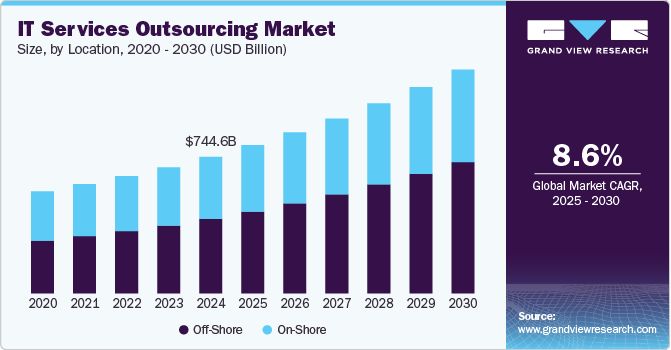What is Offshore Mobile App Development?
Offshore mobile app development means hiring a team or a company from another country to create mobile apps. This is often done because they provide skilled IT workers at lower costs.
The team based overseas handles all parts of building the application. They take care of design, coding, testing, and maintenance. The client company manages the project from a distance. This method has become more common due to the global growth of the IT industry and improvements in communication and project management tools.
Why Offshore Development Is Still An Effective Strategy In 2024?
Experts forecast a consistent rise in the market size of IT outsourcing over the next decades. The global IT services outsourcing market size was estimated at USD 744,623.5 million in 2024. Nonetheless, CAGR is projected to grow at 8.6% from 2025 to 2030. The reason for this trend is obvious: cost-effective, notably skilled talent, and speed.

Offshore development helps businesses save over 70% on labor costs. They do this by outsourcing tasks to low-wage countries like India, Vietnam, and the Philippines. A study by Deloitte found that 59% of businesses cited cost reduction when using outsourcing services. Also, cutting overheads, like office rent, equipment, and benefits, lowers costs.
Additionally, it helps businesses find a larger group of talented workers from around the world. A larger talent pool leads to more creative ideas and different viewpoints that fit market needs. By using teams in different time zones, companies can work all day and night.
This ongoing development gives companies an edge in a fast-paced environment. In today’s changing business world, economic challenges and new technology are pushing growth. Therefore, offshore development is likely to stay an important strategy for innovation.
What Do You Have To Consider When Offshoring Application Development?
When Does A Business Need Offshore Development Services?
Lack of In-House Expertise:
Businesses often turn to offshore development when they don’t have the necessary skills or experience with their in-house developers. This is particularly common in specialized areas like mobile app development. Whenever clients require much technical expertise that is beyond the capabilities of their staff, finding a professional by offshoring to fill the skill gaps is a smart move to close the deal quickly.
Offshore development services can be a smart choice for businesses wanting to innovate and stay competitive. By using offshore teams, companies can access advanced technologies and methods that might not be available locally. This speeds up the development process and helps businesses add the latest features to their applications.
Additionally, offshore teams often have experience working on different projects in various industries. This experience can provide useful insights and best practices. Collaborating with these teams can result in stronger applications that meet the changing needs of users. In the end, this improves the overall user experience and satisfaction.
Need for Cost Reduction:
Small companies and startups on a budget may consider offshore development as a cost-saving option due, to its ability to offer top-notch services at a reduced rate compared to hiring local developers. Enabling businesses to cut costs while reaching their objectives effectively.
Requirement for Speed and Scalability:
Businesses usually face the situation that they need to scale up their team quickly in the short term or need many skilled experts to launch a new application to meet the demands of the fast-paced market. Hence, offshore mobile app development will be an effective solution in the scenarios. By utilizing teams based in countries for development purposes companies have the opportunity to expand their development capabilities without the lengthy delays associated with recruiting and training new employees internally. These international teams are able to work thanks to varying time zones, which speeds up the development timeline. Moreover, outsourcing enables companies to easily adjust team sizes according to project requirements offering adaptability, in dynamic work settings.
What Types of Tasks Can Offshore Application Developers Handle?
Full-Cycle Development: Companies can delegate the development process to offshore teams. It covers everything from conceptualization and design to actual coding and launching to the end product. Allowing them to entrust the full project to skilled experts.
Maintenance and Support: In addition to development tasks offshore teams can offer maintenance services. This involves updates, fixing bugs, and making sure the app runs smoothly.
Special Skill Task: If your project demands expertise like incorporating AI technology, a sophisticated backend infrastructure, or there is any special task that you can not handle because of a lack of skills. Offshore can help you to make things work.
The Challenges Of Offshore Application Development And How To Address?
Communication Barriers
Seamless communication is a key to any project in software development. Since the cost of your project is counted on each hour of coding, poor communication can slow down your development process and cost you more money. When offshoring, you may have to face many communication challenges. The typical challenges are different time zones, language barriers, and cultural misunderstandings. These can lead to a lack of collaboration and delays in some phases of the development time.
Know how to solve the problem to keep all the tasks on track and meet the deadline. Firstly, make sure that your offshore team has a flexible working time, so they can attend important meetings and avoid missing communication with your in-house team. Secondly, it is crucial to use collaboration tools like Slack, Jira, and Trello, to document everything, and keep people updated on each task. Finally, to manage all the steps smoothly, establish communication guidelines and regular meetings to keep all members on track.
Quality Assurance
When collaborating with offshore teams ensure to uphold top-notch standards for quality work; a strategy that involves incorporating testing and code evaluations at different stages of the project development process is crucial. Moreover; setting precise anticipations and sustaining transparent communication channels with offshore teams play a significant role in guaranteeing that the end product aligns, with the necessary criteria.
Security and IP Protection
Protecting information and intellectual assets is a top priority when subcontracting development tasks. To address these challenges effectively, companies ought to implement non-disclosure agreements (NDAs ) and adhere to secure programming methods. Furthermore, research and select overseas collaborators who function within robust legal structures to safeguard both information security and intellectual property rights.
How To Choose A Qualified Offshore Partner
Last but not least, finding an appropriate partner is never an easy task. It may take you through a bunch of meetings, or discovery calls. Before doing any of those, make sure that you have noted down these points to have the perfect match.
Relevant Expertise
When selecting a partner for offshore development work, ensure they possess the technical knowledge for your project requirements. This involves the team being knowledgeable in the technologies platforms, and frameworks needed for your project. For instance, if you are creating an application, the offshore mobile development team should have demonstrated expertise in the relevant programming languages ( like Swift for iOS or Kotlin for Android ) and essential development tools.
It is crucial to take into account if the offshore partner has expertise in your specific industry. Industry knowledge means the team will better understand your needs. They will be prepared for any challenges you may encounter and will address them promptly.
Portfolio and Client Reviews
Review Past Projects:
A good way to check the skills of an offshore development partner is to look at their past work.
You have to carefully and thoroughly analyze the quality and complexity of the projects they have undertaken. It will provide insight into whether they have a suitable fit or not.
For example, if you need an e-commerce app, check if they have experience in creating strong and easy-to-use e-commerce platforms that lead to high sales.
Client Reviews and References:
When assessing a partner for your project or business requirements, reviews, and references should be a part of your evaluation process. Thoroughly review testimonials and case studies. Please ask for references from past clients. This will help you gauge their satisfaction with the partner’s services. Positive feedback and reliable references serve as indicators of trustworthiness and a proven track record.
You can also reach out to the partner for contact information of clients to hear firsthand about their experiences. This stage can provide a glimpse into the partner’s level of professionalism in terms of communication and delivery.
Legal Consideration
Contract Clarity
When collaborating with a development partner it’s crucial to have a well-defined contract that covers all the important aspects. Having guidelines in these areas can help avoid confusion and ensure that both parties are in sync with each other’s expectations. It’s important to include clauses in the contract regarding how any scope changes will be handled and what penalties will apply for delays in delivery and poor work quality.
Compliance with Local Laws
Following local laws helps avoid legal issues. They may differ from those in the offshore team’s location. For example, if you are collecting data, your offshore mobile app development partner must know about the GDPR.
NDA Sign
Before disclosing any details to an offshore collaborator or partner, remember to have them sign a Non-Disclosure Agreement (NDA). By signing an NDA, the partner has to maintain confidentiality and safeguard your information. Furthermore, they must guarantee that it will not be disclosed or utilized beyond the boundaries of your project. This precautionary measure enhances security. Provides reassurance when collaborating with an outside team.
Learn more about mobile application development:
Top Emerging Mobile App Development Frameworks in 2025




